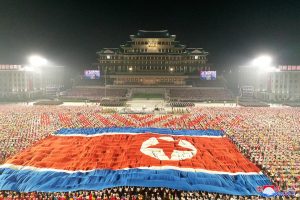
North Korea fires two more missiles into its ‘firing range’ of the Pacific
SEOUL — North Korea launched two more ballistic missiles off its east coast on Monday, with the powerful sister of leader Kim Jong Un saying Pyongyang’s use of the Pacific as its “firing range” would depend on the behavior of US forces.
The launches come just two days after North Korea fired an intercontinental ballistic missile (ICBM) into the sea off Japan’s west coast, prompting the United States to hold joint air exercises with South Korea and separately with Japan on Sunday.
North Korea’s state media confirmed it fired two projectiles from a multiple rocket launcher, aiming at targets 395 km (245 miles) and 337 km (209 miles) away, respectively.
“The 600mm multiple rocket launcher mobilized in the firing… is a means of tactical nuclear weapon,” capable of “paralyzing” an enemy airfield, state news agency KCNA said.
Japan’s Defense Ministry said the two missiles, launched around 2200 GMT, reached a maximum altitude of about 100 km and 50 km, and fell outside Japan’s exclusive economic zone.
Japanese Prime Minister Fumio Kishida said he had requested an emergency UN Security Council meeting over the tests, and Jiji news agency said the gathering was set for 2000 GMT Monday.
But prospects for a new round of UN sanctions appear slim given the previous vetoes by Russia and China amid the Ukraine crisis and a Sino-US feud over Chinese balloons found in the American skies.
South Korea’s Joint Chiefs of Staff strongly condemned the launches as a “grave provocation” that should be ceased immediately.
Seoul’s foreign ministry announced sanctions on four individuals and five entities linked to Pyongyang’s weapons programmes on Monday over the latest ICBM and missile tests, in what it called its fastest-ever such response to the North’s provocations.
The ministry said its nuclear envoy had phone calls with his US and Japanese counterparts during which they agreed that North Korea’s provocations cannot be justified in any way and it will only face “consequences of self-indulgence.”
The US Indo-Pacific Command highlighted the “destabilizing impact” of North Korea’s unlawful weapons programmes, while UN spokesman Stephane Dujarric urged Pyongyang to halt such provocations banned under Security Council resolutions, and resume denuclearization dialogue.
TENSIONS RISING
North Korean leader Kim’s sister, Kim Yo Jong, warned against increased presence of US strategic military assets following the joint air drills with its Asian allies over the weekend.
“The frequency of using the Pacific as our firing range depends upon the US forces’ action character,” she said in a statement carried by KCNA.
The United States and South Korea are set to hold simulated nuclear tabletop exercises aimed at improving operations of American nuclear assets this week, as well as annual springtime Freedom Shield field training in March.
Pyongyang’s foreign ministry said last week it would respond to the planned exercises with “unprecedentedly persistent, strong counteractions.”
“Tension on the peninsula is likely to reach its peak in coming months as North Korea is accelerating its military actions with higher frequency, and her statement indicates that it would continue impromptu missile tests using the Pacific as its shooting range,” said Yang Moo-jin, a professor at the University of North Korean Studies in Seoul.
Hong Min, a senior fellow at the South’s Korea Institute for National Unification, said Kim’s mention of the Pacific suggested the North would fire more longer range missiles more often.
Monday’s missile launch is the North’s third known weapons test this year after it fired an unprecedented number of missiles last year, including ICBMs capable of striking anywhere in the United States.
Kim Yo Jong also criticized some South Korean experts who questioned the reliability of the ICBM capability saying Saturday’s “sudden” test required nine hours of preparations, calling them “disgusting” and “stupid.”
The launch took place “at the most appropriate time” considering weather conditions and after US and South Korean scout planes went away, she said.
“They had better rack their brains to take measures to defend themselves, instead of doubting or worrying about other’s technology,” she said.
“We affirm once again that there is no change in our will to make the worst maniacs escalating the tensions pay the price for their action.” — Reuters
